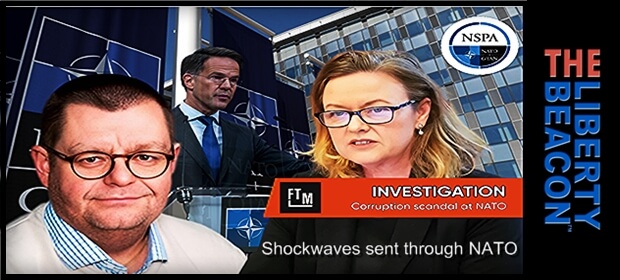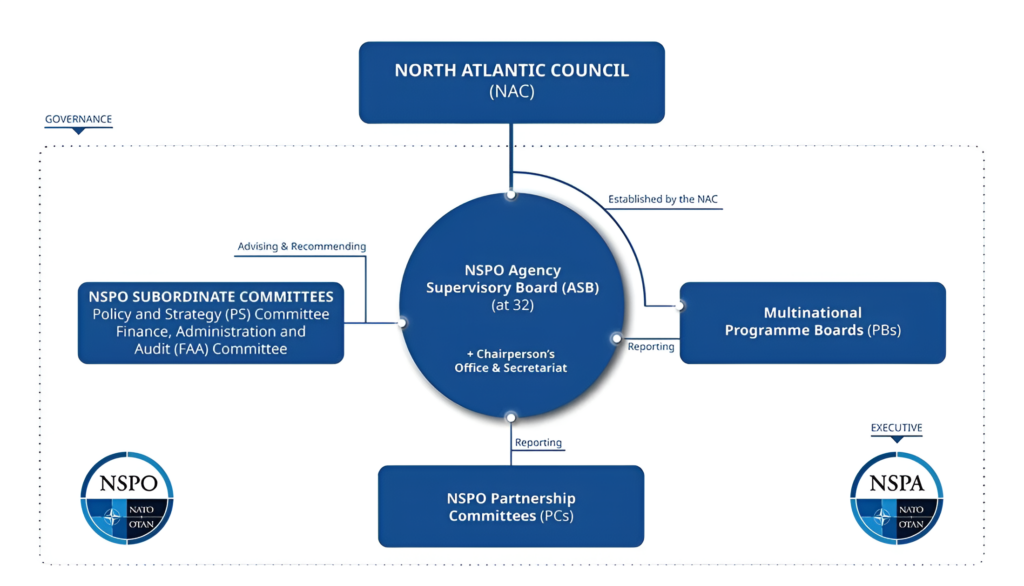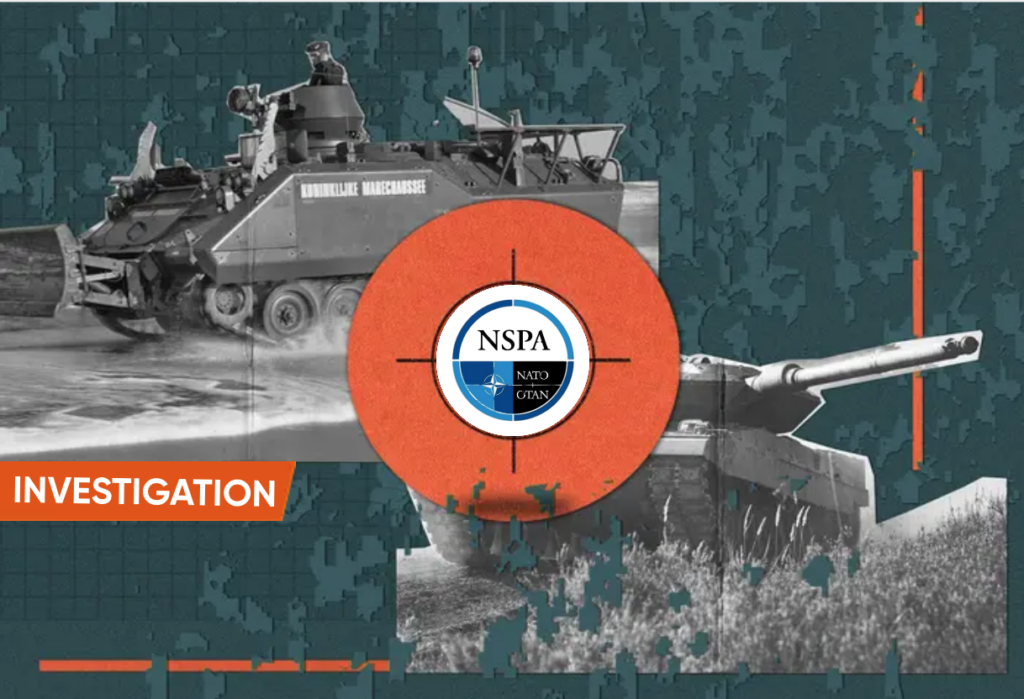
NATO in the Spotlight: Procurement Scandal Hits the Alliance
NATO Support and Procurement Agency (NSPA) has sent shockwaves through an organisation that often boasts about its unity and integrity.
21WIRE –
A new investigation has cast an uncomfortable spotlight on NATO’s procurement machinery, revealing a corruption scandal that reaches deep into the heart of the Alliance’s logistics and acquisition arm, the NATO Support and Procurement Agency (NSPA). Reporting by Follow the Money reveals that senior NSPA officials may have manipulated tenders, leaked confidential bidding data, and steered contracts through opaque channels, accusations that have sent shockwaves through an organisation that often boasts about its unity and integrity.
Yet for seasoned observers of NATO, this scandal is less an aberration and more a reminder of longstanding vulnerabilities. Defence procurement has always been a high-risk frontier: vast budgets, complex supply chains, and layers of discretion create an environment where oversight can falter and misconduct can thrive. NATO itself has repeatedly acknowledged these structural weaknesses, even as it has sought to strengthen transparency.
The current investigation, centred at NSPA headquarters in Luxembourg, has triggered a sprawling legal effort involving Eurojust, the European Union Agency for Criminal Justice Cooperation, and multiple European jurisdictions, including Belgium, the Netherlands, Spain, and Luxembourg. Investigators are exploring allegations of insider leaks and bribery, claims serious enough to prompt NATO leaders to reaffirm their “zero-tolerance” stance and fast-track internal reforms.
NSPA is headquartered in the Grand Duchy of Luxembourg, with main operational centres in France, Hungary and Italy and an outstation in Kosovo. The agency reports directly to the North Atlantic Council and is the executive body of the NATO Support and Procurement Organisation (NSPO), of which all NATO Allies are members. Those nations are represented in the NSPO Agency Supervisory Board (ASB), which directs and controls the activities of the NSPA. For reasons we cannot explain, the NSPO website is currently out of service. The Chairman of the NATO Support and Procurement Organisation Agency Supervisory Board is a Norwegian National, Per Christensen, to whom the General Manager of NATO Support and Procurement Agency (NSPA), US National Stacy Cummings reports.
Amid various allegations, Geneviève Machin, the human resources director of the NSPA, accused Cummings and senior aides of neglecting to probe into corruption cases and of exerting pressure on her to favor specific candidates for top positions within the agency.
CHART: NSPO Agency Supervisory Board (ASB) Governance chart (Source: NSPA-NATO)

This episode is part of a wider historical pattern. Defence procurement has long attracted controversy, from the United States’ “Operation Ill Wind” in the 1980s to Belgium’s infamous Agusta Dassault affair, which ensnared political elites and even touched a former NATO Secretary General. These cases underline what experts have warned for decades: where enormous contracts intersect with strategic urgency, corruption risks are never far behind.
At the same time, the scandal lays bare a striking irony: while NATO has positioned itself as a mentor in reforming Ukraine’s defence procurement system, lecturing Kyiv on transparency, accountability, and Western standards, the Alliance now finds its own procurement arm mired in allegations of favouritism, insider leaks, and bribery. For years, NATO advisers have pressed Ukraine to eliminate corrupt networks and modernise procurement processes, citing everything from inflated contracts to outright embezzlement. Yet as Kyiv struggles to clean up its defence institutions, the NSPA scandal reveals that the Alliance itself is hardly immune to the very governance failures it warns others against. The juxtaposition is unsettling: NATO insists on stringent reforms abroad while grappling with misconduct at home, raising uncomfortable questions about credibility, consistency, and whether the Alliance can demand from partners what it has not yet fully secured within its own walls.
Against this backdrop, the present case is more than an isolated ethical breach: it raises fundamental questions about NATO’s political cohesion, its ability to coordinate collective defence efficiently, and its credibility in promoting rule-based governance abroad. This report examines the scandal, its institutional context, and its broader implications for the Alliance at a critical juncture.

Simon Van Dorpe and Jesse Pinster report for Follow the Money…
NATO’s procurement chief under fire amid corruption scandal, leak reveals
The NATO Support and Procurement Agency (NSPA) is embroiled in a corruption scandal, and top officials have raised concerns about its approach to combating corruption. Internal documents reveal how General Manager Stacy Cummings has faced strong criticism this year over perceived inaction, as well as allegations of favouritism and interference.
Top officials at NATO’s procurement agency this year accused its chief of favouritism, failing to investigate corruption, and undue interference in their work, leaked internal reports reveal.
Stacy Cummings, general manager of the NATO Support and Procurement Agency (NSPA), was criticised in writing on separate occasions by the heads of human resources and internal audit, according to documents first published today by Follow the Money and its media partners La Lettre, Le Soir and Knack.
The internal conflict follows revelations of a sprawling corruption scandal at the agency, and at a time when it is rapidly expanding to meet soaring demand for military equipment. The NSPA supplies members of the military alliance and partner countries with everything from weapons systems and ammunition to logistical support, including fuel deliveries and even catering services.
“Corruption is an enduring disease at the NSPA”
In October, FTM and its media partners exposed five corruption investigations linked to the NSPA and uncovered which of the agency’s current and former staff are under investigation. Bribes were allegedly paid by defence companies bidding for contracts to supply NATO or the alliance’s 32 member states.
The latest findings, revealing the internal tensions and concerns about Cummings’ oversight, raise further questions about the NSPA’s ability to prevent fraud and corruption.
“Corruption is an enduring disease at the NSPA, and we are fully aware it requires stronger remedies than those officially presented by the General Manager,” said a senior NSPA employee, who spoke on condition of anonymity for fear of retaliation.
“There is a perception that the rules do not apply to the general manager and those in her inner circle.”
Cummings, an American citizen who held several senior roles in the U.S. government, took charge of the NSPA in September 2021. At the time, the agency, which is based in the village of Capellen, Luxembourg, was relatively small and largely out of the spotlight. But Russia’s full-scale invasion of Ukraine in February 2022 and NATO’s recent pledge to ramp up defence spending has changed the landscape.
Now, with the end of Cummings’ five-year term approaching, the NSPA is a different beast.
This year, it’s projected to handle procurement contracts worth 9.5 billion euros – a sum that has nearly tripled since 2021. But considering the severity of the accusations against Cummings, it is hard to dismiss the current turmoil at NSPA – which has almost 1,600 staff – as mere growing pains.
Allegations of inaction
The first blow against Cummings this year came from the NSPA’s human resources director Geneviève Machin. In a letter to all NATO member states dated 21 February 2025, Machin accused Cummings and senior aides of failing to investigate corruption cases, and of pressuring her to favour certain candidates for high-level appointments at the agency.
“Cases involving reasonable surety of fraud, corruption, and/or abusive activities are not being investigated,” the Canadian HR director wrote in the letter, which was first reported by La Lettre in May, but had not been published until today. CLICK HERE TO VIEW…
Since then, five judicial investigations into suspected corruption at the NSPA came to light: two in the United States– which were mysteriously dropped – one in Romania, one in Belgium and one in Luxembourg, with millions of euros in bribes allegedly paid.
About the alleged favouritism in hiring staff, Machin wrote that she “was pressured by [Cummings’ chief of staff] to alter the contents of the selection report [for a new director of acquisition programmes].”
Machin also said that the agency, under Cummings’ leadership, had “not been transparent with the nations [the NATO member states sit on a board that oversees the NSPA] regarding recruitment activities and has responded with inaccurate and misleading information”.
“By standing up to this, I have become a target and am being subjected to retaliation, including early termination of my contract,” she concluded in her letter.
Machin was suspended the day after she sent the letter to the NATO members, and later learned that her contract, which ended in September, would not be renewed.
According to internal documents seen by FTM, the NSPA’s board in early March appointed an external investigator to verify Machin’s allegations. The report was due by 17 June, but five months later, it has yet to be delivered. Cummings and Machin did not respond to requests for comment.
NATO spokeswoman Allison Hart said that it would be up to the NSPA’s supervisory board to investigate any “allegations of workplace misconduct by the NSPA general manager”.
Fight over audit plan
Some of Machin’s accusations were echoed in an internal audit report from October, a copy of which was also obtained by FTM and its media partners. It outlines numerous deficiencies at the NSPA, a lack of measures to prevent fraud and corruption, and an unwillingness by leadership to address the issues.
The outgoing head of the internal audit team, Gerardo Bellantone, proposed including an audit of the agency’s anti-fraud and anti-corruption framework in the 2025 audit plan. But the “proposal was not supported” by Cummings, the Italian wrote in the report. In the internal audit report, Bellantone stated that his contract was not being renewed. He was critical of Cummings about the way the job vacancy for his successor was being handled. His replacement will start in September 2026, according to a vacancy posted by NSPA. (CLICK HERE TO VIEW)
On 17 September, the U.S. representative on the NSPA’s supervisory board, Kevin Baird, intervened to block the specific audit from being executed, according to another document seen by FTM. In the internal audit report, Bellantone also “expressed serious concerns on the organisational independence of the internal audit function at NSPA and on the high level of pressure he is subjected [to] when performing his activities”.
Bellantone singled out Cummings for having requested “to remove a sentence from the 2026 Internal Audit Plan”. He described this as “a serious threat to the independence” of his function.
Tensions came to a head at a 22-23 October closed-door meeting of one of the subcommittees overseeing the NSPA, during which Bellantone and Cummings both addressed the member state representatives. The representatives could not agree on whether to include an additional audit of the NSPA’s corruption policies in the 2025 plan. This has been provisionally delayed until 2026. Bellantone did not respond to a request for comment.
NATO spokeswoman Allison Hart declined to comment on the specific cases highlighted here.
“As a matter of policy, NATO does not comment on the details of internal staffing matters,” Hart said. However, she stressed that “NATO has no tolerance for fraud or corruption”.
__________
(TLB) PUBLISHED THIS REPORT FROM 21WIRE
SUPPORT INDEPENDENT MEDIA – BECOME A MEMBER @21WIRE.TV & VISIT OUR TELEGRAM CHANNEL
Header featured image (edited) credit: Chairman of the NATO Support and Procurement Organization Agency Supervisory Board (NSPO) Per Christensen (left), and General Manager of NATO Support and Procurement Agency (NSPA) Stacy Cummings (right).. Emphasis & additional editing by (TLB)
••••
••••
Stay tuned…
![]()
••••
The Liberty Beacon Project is now expanding at a near exponential rate, and for this we are grateful and excited! But we must also be practical. For 7 years we have not asked for any donations, and have built this project with our own funds as we grew. We are now experiencing ever increasing growing pains due to the large number of websites and projects we represent. So we have just installed donation buttons on our websites and ask that you consider this when you visit them. Nothing is too small. We thank you for all your support and your considerations … (TLB)
••••
Comment Policy: As a privately owned web site, we reserve the right to remove comments that contain spam, advertising, vulgarity, threats of violence, racism, or personal/abusive attacks on other users. This also applies to trolling, the use of more than one alias, or just intentional mischief. Enforcement of this policy is at the discretion of this websites administrators. Repeat offenders may be blocked or permanently banned without prior warning.
••••
Disclaimer: TLB websites contain copyrighted material the use of which has not always been specifically authorized by the copyright owner. We are making such material available to our readers under the provisions of “fair use” in an effort to advance a better understanding of political, health, economic and social issues. The material on this site is distributed without profit to those who have expressed a prior interest in receiving it for research and educational purposes. If you wish to use copyrighted material for purposes other than “fair use” you must request permission from the copyright owner.
••••
Disclaimer: The information and opinions shared are for informational purposes only including, but not limited to, text, graphics, images and other material are not intended as medical advice or instruction. Nothing mentioned is intended to be a substitute for professional medical advice, diagnosis or treatment.

Leave a Reply